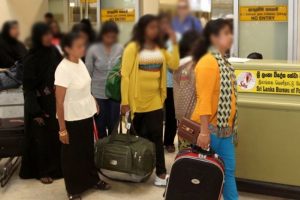Sri Lanka Considers Ban on Sending Women as Overseas Housemaids: Economic Impact and Ethical Concerns
Sri Lanka’s Minister of Labour and Foreign Employment, Manusha Nanayakkara, has proposed a plan to halt the migration of Sri Lankan women for overseas domestic work within the next decade. This proposal has sparked debate, raising questions about its economic impact, ethical considerations, and potential alternatives.

Economic Contributions:
Remittances: In 2022, remittances from Sri Lankans working abroad reached $8 billion USD, constituting 9.6% of the country’s GDP. While official data doesn’t isolate housemaids’ contribution, it’s a significant portion.
Formal Recruitment Fees: Agencies charge fees to both employers and workers, generating revenue for Sri Lanka.
Ethical Concerns:
Exploitation and Abuse: Reports of unfair treatment, low wages, and even abuse towards Sri Lankan housemaids in host countries raise ethical concerns.
Dependence on Remittances: Over-reliance on remittances can make the economy vulnerable to external shocks.
Arguments for the Ban:
Improved Working Conditions: Banning domestic work could protect women from exploitation and encourage safer migration options.
Upskilling the Workforce: Promoting skilled jobs could offer better wages and long-term benefits for individual workers and the economy.
Arguments Against the Ban:
Economic Impact: A sudden ban could negatively impact remittances and livelihoods of families dependent on them.
Individual Choice: Restricting migration options could limit women’s agency and economic opportunities.
Next Steps:
Minister Nanayakkara has called for stakeholders, including foreign employment agencies, to submit proposals and plans for implementing the ban. The government is likely to consider various factors, including economic impact, ethical concerns, and potential alternatives like improving regulations and worker protections in the domestic work sector.







